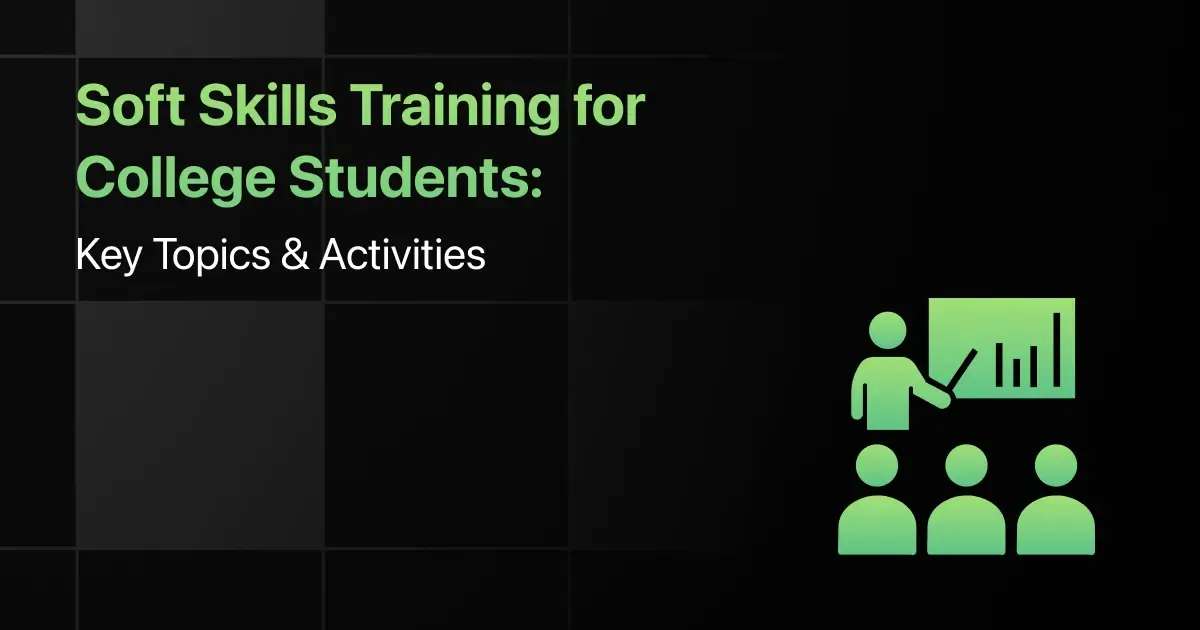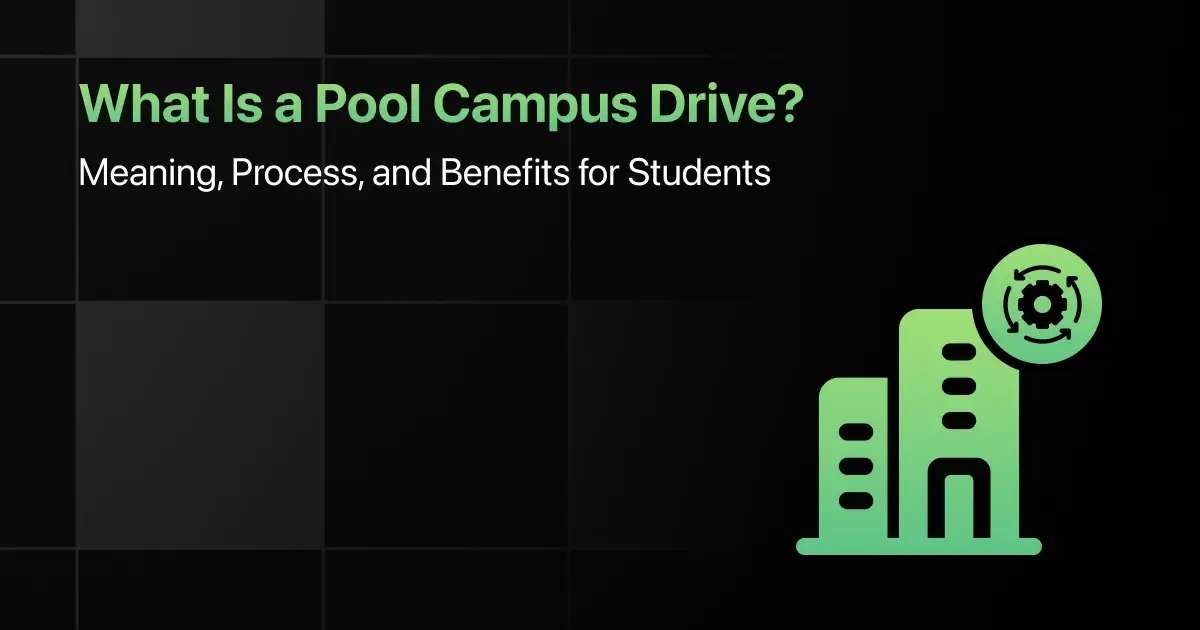Soft Skills Training for College Students: Key Topics & Activities

Are you feeling out of your element preparing for campus placements in India? While there is plenty of discussion about soft skills training for college students, very few offer a roadmap to developing them. Which soft skills should you be focusing on? How do you practise them? How do you track improvement? Many freshers or students are completely lost, confused, or overwhelmed as they go through the process of preparing for campus placements in India.
According to the 2025 Mercer-Mettl India Graduate Skills Index, only 42.6% of Indian graduates were found employable in 2024. You see, while having a good amount of technical knowledge (coding, SQL, AI, project work, etc.) is important, it is not enough to get you a job. Today’s recruiters expect you to have good communication skills, the ability to work well with others, and the ability to adapt to new situations.
The purpose of this guide is to provide you with a clear path forward with your soft skill development. You will learn the following:
- What are the top soft skills that every student needs to develop (communication, teamwork, leadership, problem-solving, and emotional intelligence)
- Practical, hands-on activities you can do in your college classroom or online to improve your soft skills
- Examples from real-life interviews that show how soft skills have been a deciding factor in whether candidates are selected or rejected.
This guide is your roadmap to the development of soft skills while in college.
Start with the complete Placement Preparation roadmap for freshers by checking out the guide on “Important Topics to Prepare for Campus Placements (2025) Guide.”
Soft Skills Master Index for Indian College Students (2025)
| Skill | What It Really Means | How To Build It | How It’s Tested |
|---|---|---|---|
| Communication | Clear speaking & writing | Mock interviews | HR & GD rounds |
| Teamwork | Working in diverse teams | Group projects | Group discussion |
| EQ | Control emotions | Reflection | Behavioral interview |
| Leadership | Initiative | Hosting events | Situational questions |
| Critical Thinking | Logical decisions | Case studies | Problem-solving tests |
| Time Management | Deadlines & planning | Task audits | Assessment centers |
What are Soft Skills & Why are they Important for Students?
Soft Skills are the personal and interpersonal skills that allow students to effectively communicate, work with others in a team approach, resolve conflicts, be adaptable to new changes, and so on. Soft Skills demonstrate to employers how employees will behave, Act, and perform on the job as well as in the interview process. Thus, employers notice the distinction between soft skills and specific technical skills when hiring.
Many college students in India are not taught soft skills during their time at college. As an example, an applicant may know coding, SQL, or AI. However, candidates with strong soft skills such as communication, conflict management, and adaptability are more likely to be hired than those with only technical skills.
The Placement Success Formula (2025)
- Technical Skills + Soft Skills + Interview Strategy = Job Offer
Why soft skills matter for placements and careers:
- Effective Communication: Conveying your message in an effective way in interviews, presentations, and group discussions.
- Teamwork and Collaborative Interaction: Working successfully with colleagues to accomplish goals
- Independent Problem-Solving and Critical Thinking: Showing potential employers that you can independently solve your own problems.
- Adaptability/Leadership: Being successful in a fast-paced and constantly changing work environment, taking Charge and Being Willing to Take Initiative.
- Emotional Intelligence: Manage stress, empathise, and maintain professionalism
The ability to showcase a balanced skill set, a candidate with the necessary technical skills and nontechnical skills, will stand out among the pool of applicants.
Top Soft Skills Every College Student Must Develop in 2025
You may wonder whether soft skills are important in successfully obtaining your dream job; the answer to that question is “YES”! Every applicant must possess the following top 10 relevant soft skills before being considered for any position by potential recruiters:
1. Effective Communication
- Explanation: Express ideas clearly, listen actively, and adjust your message for your audience.
- Purpose: Helps in interviews, presentations, and team discussions. Students who can’t communicate well often get overlooked.
2. Teamwork & Collaboration
- Explanation: Work well with peers, resolve conflicts, and contribute meaningfully to projects.
- Purpose: Builds trust with recruiters and prepares you for real workplace environments.
3. Problem-Solving & Critical Thinking
- Explanation: Analyse problems and propose practical solutions independently.
- Purpose: Shows recruiters you can handle challenges confidently, which is essential during interviews and assessments.
Master aptitude & reasoning with our Quantitative Aptitude practice.
4. Adaptability & Flexibility
- Explanation: Adjust to changes, take responsibility, and lead when needed.
- Purpose: Students who adapt quickly and make themselves flexible are seen as reliable and proactive.
5. Emotional Intelligence (EQ)
- Explanation: Manage stress, empathise with others, and maintain professionalism.
- Purpose: High EQ helps you stay calm, confident, and build positive relationships, a major benefit for placements.
6. Time Management
- Explanation: Prioritise tasks and meet deadlines efficiently.
- Purpose: Prevents last-minute stress and shows organisational skills.
Practice company-specific aptitude questions here to speed up yourself.
7. Conflict Resolution
- Explanation: Handle disagreements constructively in group projects, presentations, or team activities.
- Purpose: Maintains a positive environment, improves collaboration, and demonstrates strong interpersonal skills to recruiters.
8. Networking & Relationship Building
- Explanation: Connect effectively with peers, mentors, and professionals.
- Purpose: Opens opportunities and helps learn from others’ experiences.
9. Creativity & Innovation
- Explanation: Think outside the box and propose new ideas.
- Purpose: Makes you stand out in projects, presentations, and interviews.
10. Leadership & Initiative
- Explanation: Take responsibility and guide team efforts when needed.
- Purpose: Demonstrates proactivity and ownership.
Soft Skills Training Topics for College Students (With Learning Outcomes)
The best method for preparing for future opportunities is through developing the following soft skill training areas that relate directly to obtaining employment, and therefore, how you can achieve desired results from your soft skill training:
1. Communication Skills
Training Focus: Verbal & written communication, active listening, presentation skills.
Learning Outcomes:
- Articulate ideas clearly in interviews and presentations.
- Listen actively and respond appropriately.
- Draft emails, reports, or documentation professionally.
2. Teamwork & Collaboration
Training Focus: Group activities, peer collaboration, conflict resolution.
Learning Outcomes:
- Work effectively in teams.
- Resolve disagreements constructively.
- Contribute meaningfully to group projects.
3. Problem-Solving & Critical Thinking
Training Focus: Analytical thinking, decision-making exercises, case studies.
Learning Outcomes:
- Analyze complex problems and identify solutions.
- Think critically under pressure.
- Make informed decisions independently.
4. Adaptability & Flexibility
Training Focus: Scenario-based learning, change management, resilience-building.
Learning Outcomes:
- Adapt to changing project requirements or workplace expectations.
- Respond effectively to new challenges.
- Stay calm and confident under pressure.
5. Emotional Intelligence (EQ)
Training Focus: Stress management, empathy exercises, and self-awareness activities.
Learning Outcomes:
- Manage emotions in high-pressure situations.
- Build empathetic relationships with peers and mentors.
- Maintain professionalism during interviews and group activities.
6. Leadership & Initiative
Training Focus: Leading group projects, taking responsibility, and mentoring peers.
Learning Outcomes:
- Take ownership of tasks and projects.
- Motivate and guide teammates effectively.
- Demonstrate initiative in both academic and professional settings.
7. Time Management
Training Focus: Prioritization techniques, scheduling, and deadline adherence.
Learning Outcomes:
- Plan and manage tasks efficiently.
- Meet deadlines consistently.
- Reduce stress caused by last-minute work.
8. Creativity & Innovation
Training Focus: Brainstorming sessions, idea generation, problem-solving games.
Learning Outcomes:
- Think outside the box for projects and presentations.
- Propose innovative solutions in group or individual tasks.
- Enhance your competitive edge during placements.
9. Networking & Relationship Building
Training Focus: Peer mentoring, professional events, and communication practice.
Learning Outcomes:
- Build meaningful professional relationships.
- Learn from peers, seniors, and mentors.
- Open doors to internship and job opportunities.
10. Conflict Resolution
Training Focus: Role-playing, negotiation exercises, mediation techniques.
Learning Outcomes:
- Resolve disagreements constructively.
- Maintain positive working relationships.
- Enhance team productivity and harmony.
Fun Soft Skills Activities for College Students (Classroom + Online)
Soft skills are an important skill set to master. The best way to develop any skill is through practice, not just by reading about it. Students in India will learn these soft skills by participating in fun activities that promote soft skills inside the classroom and on the internet.
1. Mock Interviews
- Skills Practiced: Communication, confidence, adaptability
- Description: Conduct mock interviews with peers or mentors. Record and review your answers.
- Benefit: Improves clarity, confidence, and readiness for real campus placements.
2. Group Projects / Case Studies
- Skills Practiced: Teamwork, problem-solving, collaboration
- Description: Work in teams to solve real or simulated case studies.
- Benefit: Teaches coordination, conflict management, and critical thinking.
3. Role-Playing Exercises
- Skills Practiced: Leadership, conflict resolution, emotional intelligence
- Description: Simulate workplace scenarios like resolving disputes or leading online meetings.
- Benefit: Builds empathy, decision-making, and practical leadership skills.
4. Public Speaking & Presentations
- Skills Practiced: Communication, confidence, creativity
- Description: Present a topic to classmates or online peers. Use slides or props for engagement.
- Benefit: Enhances articulation, persuasion, and clarity of thought.
5. Time Management Challenges
- Skills Practiced: Time management, prioritization, stress handling
- Description: Assign multiple tasks with strict deadlines, or simulate a “hackathon” scenario.
- Benefit: Improves efficiency, focus, and task prioritization.
6. Networking & Peer Mentoring
- Skills Practiced: Relationship-building, emotional intelligence
- Description: Participate in webinars, online workshops, or mentorship programs.
- Benefit: Develops professional connections and communication skills.
7. Brainstorming & Innovation Sessions
- Skills Practiced: Creativity, problem-solving, collaboration
- Description: Generate ideas for projects, presentations, or competitions in groups.
- Benefit: Encourages innovative thinking and teamwork.
8. Feedback & Reflection Exercises
- Skills Practiced: Emotional intelligence, adaptability, communication
- Description: Give and receive constructive feedback after projects or presentations.
- Benefit: Increases self-awareness, interpersonal skills, and continuous improvement.
9. Leadership Role Assignments
- Skills Practiced: Leadership, initiative, accountability
- Description: Take charge of a student group, event, or club activity.
- Benefit: Develops confidence, decision-making, and responsibility.
10. Problem-Solving Games / Simulations
- Skills Practiced: Problem-solving, critical thinking, teamwork
- Description: Participate in escape rooms, puzzles, or online simulations.
- Benefit: Enhances logical thinking, strategy, and collaborative skills.
How Soft Skills Impact Placement Preparation?
A survey by SkillSurvey (reported via the Wadhwani Foundation) finds that 77% of employers believe soft skills are as important as hard skills, and 67% of HR managers would hire candidates with strong soft skills even if their hard skills are weak.
Soft skills are more than just buzzwords; the outcomes of interviews and placements are determined by soft skills. Here are some real-life examples of how strong soft skills helped Indian students get their dream jobs.
1. Effective Communication
- Scenario: During a technical interview, a student knew all coding concepts but struggled to explain solutions. Another candidate explained clearly, structured answers, and asked clarifying questions.
- Outcome: The student with better communication skills was selected, even though both had similar technical knowledge.
2. Teamwork in Group Discussions
- Scenario: In a group discussion round, one student dominated the conversation while another listened, built on peers’ points, and guided the discussion collaboratively.
- Outcome: Recruiters praised the collaborative candidate, who got shortlisted for the next round.
3. Problem-Solving Under Pressure
- Scenario: During a case study exercise, one candidate panicked under time constraints. Another analyzed the problem, proposed a solution quickly, and explained the reasoning.
- Outcome: The candidate who solved problems calmly and logically was selected, demonstrating the power of critical thinking.
4. Leadership & Initiative
- Scenario: A student volunteered to lead a small project during the assessment round and motivated teammates to complete tasks efficiently.
- Outcome: Recruiters noted proactive leadership as a differentiator between similar technical profiles.
5. Emotional Intelligence Matters
- Scenario: During an interview, a candidate faced tough questions and unexpected challenges. He stayed calm, responded empathetically, and maintained professionalism.
- Outcome: Their high EQ impressed recruiters, helping them secure the offer over others who were technically strong but stressed easily.
Combine technical prep with soft skills, start your coding & interview prep here with this guide on “Best Websites for Technical Interview.”
Soft Skills vs Hard Skills: What’s the Difference?
When preparing for placements, students often focus only on technical skills. But recruiters in India look for a balanced mix of hard and soft skills. Understanding the difference can help you stand out in interviews and group assessments.
| Feature | Soft Skills | Hard Skills |
|---|---|---|
| Definition | Personal and interpersonal skills that influence how you interact, communicate, and solve problems. | Technical knowledge or abilities specific to a job or field, e.g., coding, SQL, AI, data analysis. |
| Examples | Communication, teamwork, leadership, adaptability, emotional intelligence, and problem-solving. | Programming, database management, AI algorithms, Excel, and engineering knowledge. |
| Learning Method | Practice through activities, workshops, role-playing, group exercises, and online exercises. | Learn via courses, textbooks, coding practice, certifications, and project work. |
| Assessment | Observed in interviews, group discussions, presentations, and behavior during team tasks. | Assessed via exams, technical tests, assignments, and project evaluations. |
| Importance in Placements | Helps you impress recruiters, work well in teams, handle pressure, and fit the company culture. | Ensures you can perform the job tasks and meet technical requirements. |
| Flexibility | Transferable across jobs, industries, and situations. | Job-specific; may require updating or learning new technical skills. |
| Impact on Career Growth | Strong soft skills often determine promotions, leadership roles, and long-term success. | Strong hard skills help you qualify for jobs and execute technical responsibilities. |
What Recruiters Reject First (Reality Check)
- Poor communication
- Negative attitude
- No teamwork stories
- Low confidence
- Zero initiative
- Emotional instability
These eliminate more candidates than poor technical knowledge.
How PlacementPreparation.io Helps Students Build Soft Skills?
PlacementPreparation.io provides:
- Mock interviews with feedback
- Soft skills challenges and assessments
- Interview-ready communication modules
- Recruiter-style evaluation
- Progress tracking for improvement
If you want placement-ready skills and not just information, this platform builds confidence through practice.
Final Thoughts
Not only is developing soft skills and their associated values required for an applicant’s success in being hired and promoted throughout his or her entire working life, but also for being remembered and successful.
While all job seekers will have some level of technical proficiency, employers are looking for people who are able to communicate at a high level, work as a team, and learn quickly.
This guide has outlined:
- The most important soft skills for students.
- Examples of fun ways to develop and practice these skills in the classroom and online.
- Examples from real life of candidates who achieved success through the application of these skills and the development of their character.
- A plan for success that demonstrates the ongoing development of your soft skills.
By incorporating these skills into your daily lives today, you will be better prepared to compete in campus hiring in India by 2025 and beyond.
Frequently Asked Questions
1. Why do college students need to develop soft skills?
Soft skills help students communicate effectively, work well in teams, solve problems, and handle workplace challenges, making them more attractive to recruiters.
2. How do soft skills impact placement success?
They influence interview performance, group discussion outcomes, and HR evaluations, often tipping the balance between candidates with similar technical skills.
3. What are the top soft skills needed for students today?
Communication, teamwork, leadership, problem-solving, adaptability, emotional intelligence, creativity, networking, time management, and conflict resolution.
4. What role do teamwork and collaboration play in academic success?
Teamwork helps students complete projects efficiently, learn from peers, resolve conflicts constructively, and prepare for real-world work environments.
5. Can soft skills be learned without formal training programs?
Yes, through practice in classroom activities, online exercises, peer collaboration, and real-life experiences, but structured programs accelerate learning and provide measurable results.
6. What is the difference between soft skills and hard skills?
Hard skills are technical abilities like coding or SQL. Soft skills are interpersonal and behavioral skills like communication, leadership, and adaptability, which influence how you use your technical knowledge effectively.
7. How can PlacementPreparation.io help develop soft skills?
It offers structured modules, interactive activities, mock interviews, real interview examples, and progress tracking to help students build, practice, and master soft skills for placement success.
Related Posts


What Is a Pool Campus Drive? Meaning, Process & Benefits - Guide
Quick Definition A Pool Campus Drive is when companies conduct a single recruitment event for multiple colleges together, either offline or …









